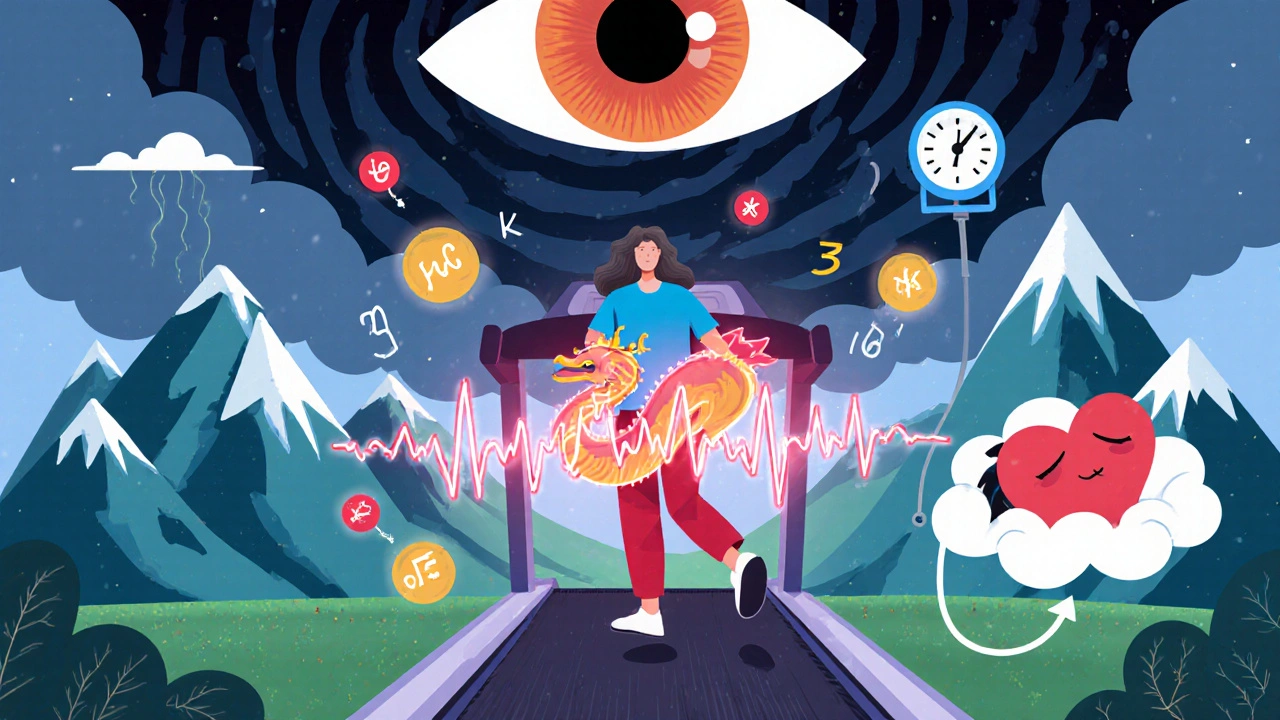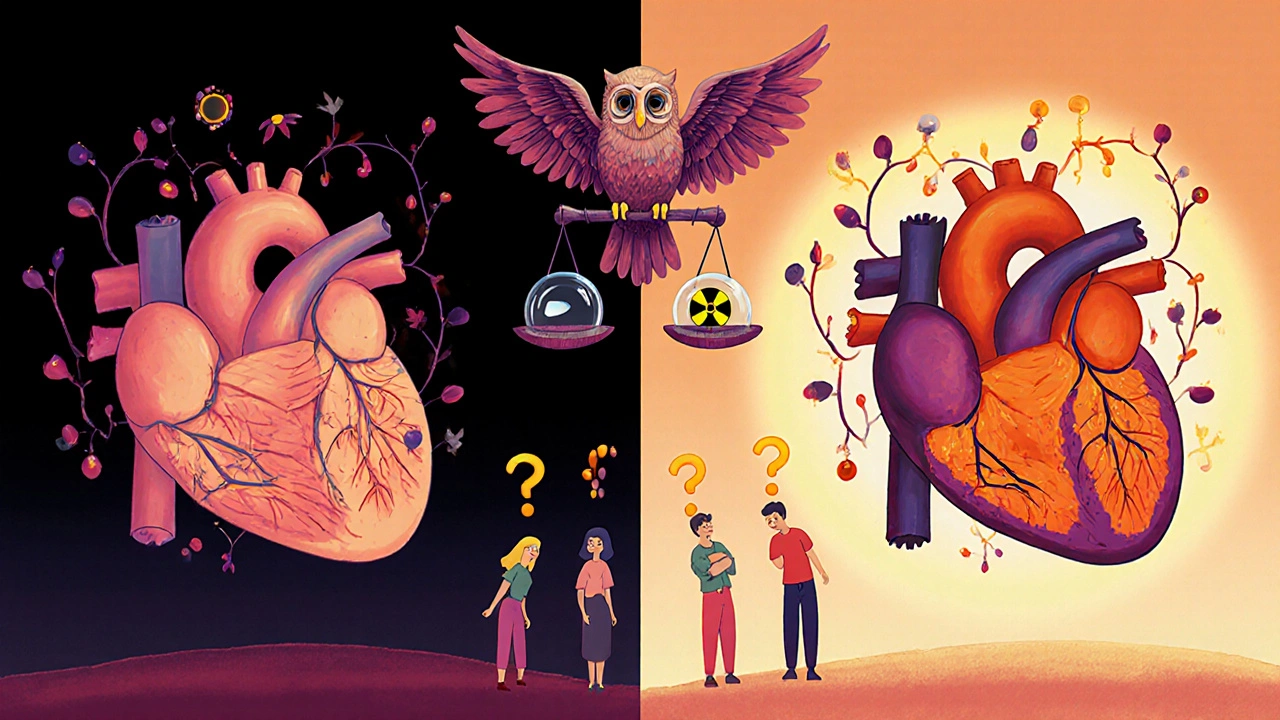What Is an ECG, and Why Do Doctors Order It?
An ECG, or electrocardiogram, is a simple, painless test that records your heart’s electrical activity. Electrodes are stuck to your chest, arms, and legs, and they pick up the tiny electrical signals your heart sends with every beat. These signals show up as waves on a graph, letting doctors see how fast your heart is beating, whether the rhythm is normal, and if there’s any damage or strain.
It’s not just for people with symptoms. Doctors use ECGs to check for past heart attacks, abnormal heart rhythms like atrial fibrillation, and signs that the heart muscle isn’t getting enough blood. A resting ECG takes less than five minutes. You lie still, breathe normally, and that’s it. No needles, no radiation, no recovery time.
But here’s the catch: a normal resting ECG doesn’t mean your heart is perfectly healthy. Many people with coronary artery disease have perfectly normal resting ECGs. That’s because the problem only shows up when the heart is working harder - like during exercise. That’s where stress tests come in.
How Does a Stress Test Reveal Hidden Heart Problems?
A stress test pushes your heart to work harder - either by making you walk on a treadmill or by using medication to simulate exercise. The goal is to see how your heart responds when it’s under pressure. If a coronary artery is narrowed, your heart might not get enough oxygen during exertion. That’s when signs like chest discomfort, abnormal ECG changes, or drops in blood pressure start to show up.
The most common type is the exercise stress test, usually done on a treadmill using the Bruce protocol. It starts slow - about 1.7 miles per hour with a 10% incline - and gets harder every three minutes. You keep going until you’re tired, your heart rate hits 85% of your maximum (calculated as 220 minus your age), or you develop symptoms like dizziness or chest pain.
Doctors monitor three key things during the test: your heart rate, your blood pressure, and your ECG pattern. If your ECG shows ST-segment depression - a dip in the wave that signals oxygen shortage - it’s a red flag for blocked arteries. Each extra minute you can walk on the treadmill lowers your risk of a future heart event by about 12%.
What If You Can’t Exercise? Chemical Stress Tests Explained
Not everyone can walk on a treadmill. People with arthritis, severe lung disease, or recent surgery often can’t reach the target heart rate. That’s where chemical stress tests come in.
Instead of exercise, doctors use drugs like adenosine, dipyridamole, or dobutamine to make your heart beat faster or widen your blood vessels. These drugs mimic the effects of physical exertion. You’ll feel warm, maybe short of breath, or have a funny taste in your mouth. Some people get chest pressure - it’s uncomfortable, but it’s not a heart attack. The whole thing lasts 30 to 60 minutes, longer than a treadmill test.
Chemical stress tests are just as accurate as exercise tests for detecting blockages. But they’re not perfect. About 15% of patients report side effects like flushing, dizziness, or nausea. That’s why doctors screen carefully before giving them. If you have asthma or certain heart rhythm problems, you might not be a candidate.

Stress Echo vs. Nuclear Stress Test: Which Is Better?
There are two advanced versions of stress testing that add imaging to the mix: stress echocardiography and nuclear stress testing.
Stress echo uses ultrasound to take pictures of your heart before and after stress. Doctors look for areas of the heart muscle that aren’t moving properly - a sign that blood flow is restricted. This test has no radiation, is highly accurate, and is especially good at spotting problems in women. Studies show it’s about 88% specific for detecting coronary artery disease - higher than standard ECG stress tests.
Nuclear stress tests use a small amount of radioactive tracer injected into your vein. A special camera then takes images of your heart to show where blood flow is low. It’s more sensitive - detecting about 85% of blockages - but it exposes you to radiation, roughly equal to three years of natural background exposure. The dose has dropped by 35% since 2021 thanks to new FDA guidelines.
Cost matters too. A nuclear stress test averages around $946, while a stress echo costs about $514. A CT scan of the heart is cheaper at $404, but it doesn’t show how your heart performs under stress - only the anatomy of your arteries.
Who Really Needs These Tests? The Guidelines
Doctors don’t order stress tests for everyone with chest pain. They use a risk calculator based on age, gender, symptoms, and other health factors to estimate your chance of having coronary artery disease.
If your risk is low (under 15%), an ECG alone is usually enough. If your risk is high (over 65%), they’ll likely go straight to a CT scan or angiogram.
But if your risk is in the middle - between 15% and 65% - a stress test is the best next step. That’s where it adds the most value. For example, a 58-year-old woman with occasional chest pressure during walking, high cholesterol, and a family history of heart disease? She’s in the sweet spot for a stress test.
Women, especially premenopausal ones, are more likely to get false-negative results on standard ECG stress tests. That’s because their heart disease often affects tiny blood vessels, not the main arteries. Stress echocardiography is better here. The American College of Cardiology now recommends it as the first choice for middle-aged women with symptoms and intermediate risk.

What to Expect Before, During, and After the Test
Preparing for a stress test is simple, but you can’t skip the details.
- 24 hours before: Avoid caffeine - coffee, tea, soda, chocolate, and even some pain relievers. Caffeine can interfere with the drugs used in chemical stress tests.
- Day of the test: Wear loose, comfortable clothes and walking shoes. Don’t eat a heavy meal two hours before. Bring a list of your medications.
- During: You’ll be hooked up to monitors. The treadmill will slowly get harder. If you feel dizzy, short of breath, or have chest pain, tell the tech immediately. They’ll stop the test if needed.
- After: Most people can drive home and go back to work. Results are often given right away - a preliminary read before you leave. A full report follows within a few days.
Some people feel anxious about the test. That’s normal. But remember: over 11 million are done every year in the U.S. alone. The risk of serious complications is less than 1 in 10,000.
What the Results Mean - and What Comes Next
A normal stress test doesn’t guarantee your heart is perfect, but it does mean you’re at low risk for a heart attack in the next year. If the test is abnormal, your doctor will look at three things: how long you lasted on the treadmill, whether your ECG changed, and whether your blood pressure dropped.
If your results are unclear, you might need another test - maybe a stress echo or a CT scan. About 25% of intermediate-risk patients end up needing more testing.
If the test confirms blockages, you might be referred for a cardiac catheterization to see exactly where the arteries are narrowed. Treatment could mean lifestyle changes, medication, or a stent.
But here’s the good news: catching a problem early through a stress test can prevent a heart attack. One Reddit user, "CardiacWarrior87," said his treadmill test caught silent ischemia his resting ECG missed. He changed his diet, started walking daily, and now checks in with his cardiologist every six months.
What’s New in Heart Testing - And What’s Coming
Technology is making stress tests smarter. Artificial intelligence now helps interpret ECG patterns during stress tests, improving accuracy by up to 22%. Portable devices like the Cardiac Dynamics StressPal are being used in doctor’s offices and even urgent care centers - with results matching those of hospital treadmills.
At Stanford, researchers are using a technique called speckle-tracking strain analysis to spot subtle heart muscle changes in women with microvascular disease. This could change how we diagnose heart problems in women who’ve been told "it’s just anxiety."
As CT scans get cheaper and faster, some experts predict stress tests will be used less in low-risk patients. But for now, they remain the go-to tool for figuring out if chest pain is heart-related - especially when you’re in that tricky middle ground of risk.
Is an ECG the same as a stress test?
No. An ECG records your heart’s electrical activity while you’re at rest. A stress test measures how your heart performs under physical or chemical stress. A stress test often includes an ECG, but it adds the element of exertion to uncover problems that don’t show up when you’re sitting still.
Can a stress test detect a heart attack?
Yes - but not always immediately. A stress test can show signs of a past heart attack, like scar tissue or abnormal heart rhythms. It can also reveal if you’re currently having a heart attack if symptoms appear during the test. But for acute heart attacks, doctors rely on blood tests (troponin levels) and immediate ECG changes, not stress tests.
Are stress tests safe?
Yes, for most people. Complications are rare - less than 1 in 10,000 tests. The test is stopped immediately if you develop chest pain, dizziness, or dangerous heart rhythms. Chemical stress tests carry slightly more risk due to side effects like flushing or shortness of breath, but these are temporary and closely monitored.
Do I need to fast before a stress test?
You don’t need to fast completely, but you should avoid eating a large meal for at least two hours before the test. More importantly, you must avoid caffeine for 24 hours before - it can interfere with the medications used in chemical stress tests.
How accurate are stress tests for women?
Standard ECG stress tests are less accurate in women, especially younger ones, because their heart disease often affects small blood vessels, not the main arteries. This leads to more false negatives. Stress echocardiography is much better for women - it’s more specific and doesn’t use radiation. Experts now recommend it as the first-line test for women with symptoms and intermediate risk.
Can I drive after a stress test?
Yes, in most cases. After a treadmill stress test, you can usually drive home right away. After a chemical stress test, you might need to wait 30-60 minutes until the medication wears off, especially if you feel dizzy. Always ask your provider for specific instructions.
How often should I get a stress test?
There’s no set schedule. Stress tests aren’t routine screenings like cholesterol checks. They’re ordered when you have symptoms like chest pain, shortness of breath with activity, or abnormal findings on an ECG. If your first test is normal and you stay healthy, you likely won’t need another for years - unless your symptoms change or your risk factors worsen.


10 Comments
Write a comment